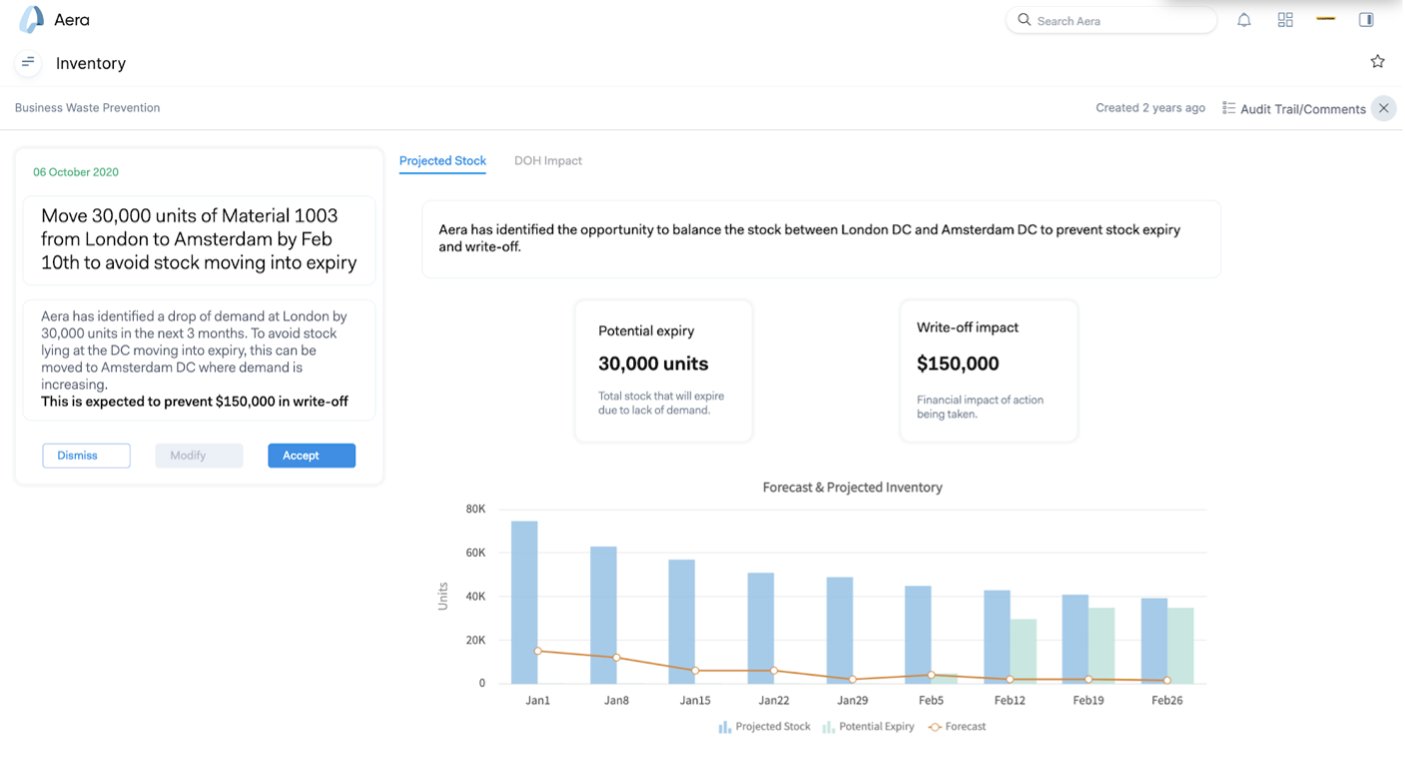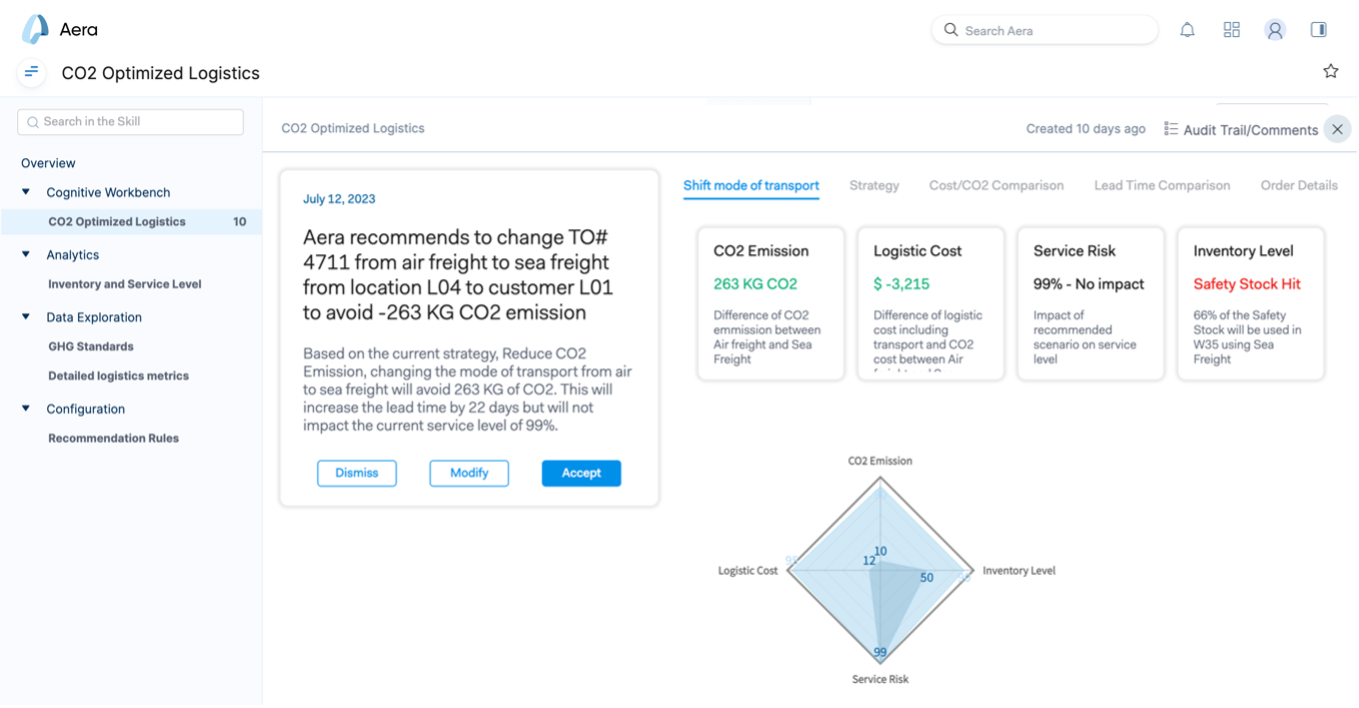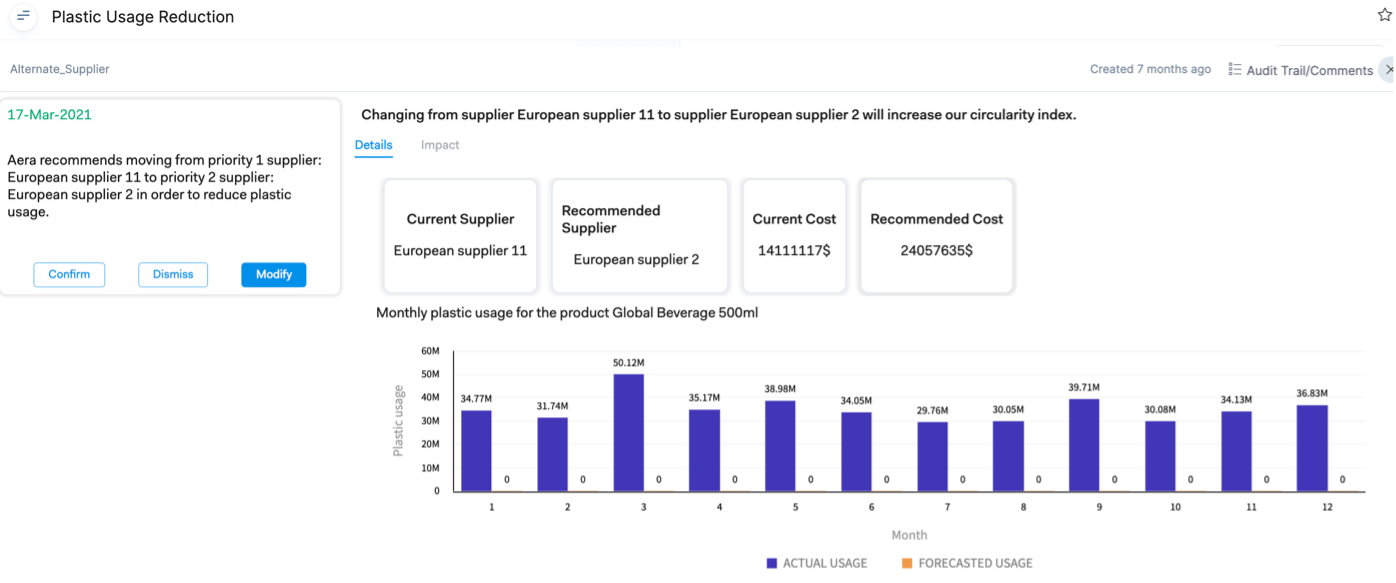Moving from Intention to Action: Decision Intelligence for Sustainability

Thanks to Nicolas Bosshard, Marc Hetzer, Ivan Kostakev, and Sebastian Kuhn of EY who co-authored this article with Michele Vismara and George Simons of the Aera Technology team.
The necessity for companies to take sustainable actions has become unavoidable due to growing demands from customers, investors, and society at large, as well as the increasingly stringent laws and regulations (such as the Corporate Sustainability Reporting Directive and the Corporate Sustainability Due Diligence Directive).
These new requirements are pressuring companies to disclose their environmental and social impacts, and more importantly, to take tangible actions towards reducing the negative and maximizing the positive ones.
Customers are more sensitive to sustainability. According to the findings of the EY Future Consumer Index, “72% feel companies and organizations should be driving better social and environmental outcomes” – a trend with direct consequences for companies in the consumer packaged goods (CPG) sector.
In this context, many organizations have made sustainability part of their core strategy, setting ambitious and time-bound targets. Some have joined forces to tackle systemic issues together and multiply their impact, through initiatives like the World Business Council on Sustainable Development, Zero100, Climate Action 100+, Alliance to End Plastic Waste, Alliance for Water Stewardship or Roundtable on Sustainable Palm Oil, to name but a few.
Yet beyond ambitions, strategies, and pledges, the current trajectory in terms of measurable progress shows a major disconnect between intention and action; this is because some hard challenges are yet to be overcome. In addition, customers are increasingly wary of greenwashing and do not buy into one-off, superficial initiatives.
The Challenges
Organizations are struggling to translate strategic commitments into actions at the operational level and embedding them into everyday decision making, in part because of the sheer volume and granularity of decisions that need to be considered. The operationalization of sustainability strategy requires updated governance, KPIs, processes, controls, systems, and of course human skills.
When sustainability gets established at the operational level, the inherent supply chain complexity – due to network and/or product structures – constitutes a major obstacle to making a scalable impact.
Even without considering sustainability, planners must rely on heuristic methods, prioritize and focus on the most critical materials and resources. Integrating sustainability adds a whole new level of complexity to the planning equation, by broadening the set of constraints to be optimized under. Once the data model gets enriched with sustainability-related insights, it becomes ever more costly and time-consuming to analyze and optimize for sustainability on top of the existing parameters such as costs and service levels.
Therefore, advanced software is key to augment planners in decision making, helping to reveal optimization potential (in finance, operations and sustainability) that would otherwise not have been realized.
To illustrate the above considerations, let us consider a company experiencing a sudden demand plan disruption due to an unforeseen event such as a new regulation requiring an updated packaging labeling. This can make the whole inventory obsolete and, depending on the level of stock on-hand, result in large financial write-offs and environmental impacts due to the physical destruction.
What is Decision Intelligence?
Decision Intelligence is the digitization, augmentation, and automation of decision-making. It goes beyond simple reports and KPIs, giving actionable and impact-oriented recommendations that optimize business objectives against complex, interrelated constraints and real-time data.
Leveraging AI and machine learning, a Decision Intelligence platform can act as a virtual member of your team – a trained digital analyst delivering well-researched and informed business recommendations that can be executed on your behalf. By digitizing your decisions, you can make more and better decisions, greatly increasing the value your teams can achieve.
How can Decision Intelligence impact sustainability?
Reduce emissions and costs by identifying and mitigating risks of obsolescence and waste: Large CPG organizations are typically losing tens to hundreds of millions a year from obsolescence – ranging from old packaging to expired raw materials and finished goods.
These losses have a significant sustainability impact, not only from the waste of the materials and emissions that were created during production but also (depending on end-of-life scenarios) the additional emissions generated during product disposal.
Based on demand and supply data, along with shelf life and other master data, Aera Decision Cloud can predict the risk of obsolescence and recommend the appropriate supply chain planning, manufacturing, logistics or procurement actions to mitigate it.
At several major global CPG companies, Aera is digitizing, augmenting, and automating the following recommendations in response to obsolescence risks:
- Recommending updates to forecasts
- Recommending promotions in order to clear stock at risk
- Canceling / updating purchase orders
- Recommending an inventory transfer within the network to rebalance inventory
- Recommending a change to the production schedule
- Recommending changes to planning parameters

Reduce CO2 emissions and transport costs by digitizing the trade-off between emissions, cost, and service level in determining route types: During the COVID-19 pandemic, many organizations took to sending orders via air to meet service levels and avoid missed sales. Many are now struggling to wind this back.
Sending an order via air rather than ocean has a significant carbon-emissions impact. Based on transport data, emissions data, order data, inventory data, and planned vs actual lead times, for every order Aera can calculate the trade-off between cost, emissions, and service levels and identify opportunities to send orders via ocean rather than air.

Reducing plastic usage by selecting alternate suppliers:
Using data supplied by the company themself or external audit companies, Aera can analyze, predict and prevent virgin plastic usage in three ways:
- Where multiple plastic specifications from different suppliers (e.g. virgin plastic vs. recycled plastic) are available, Aera can factor cost, supplier performance, and plastic indicators into the supplier-selection decision
- Help reduce plastic waste by reviewing usage against sold product, completing a root cause analysis, and generating recommendations to tackle waste
- Reviewing performance of plastic usage against targets to project future performance using machine learning, then generate recommendations to address gaps

Why Decision Intelligence is ideal for these use cases
Decision Intelligence, delivered by Aera Decision Cloud, is ideally suited to factoring sustainability goals into everyday decisions made by teams. With the ability to analyze data, apply machine learning and intelligence, and consider dynamic problems in real time, Aera can manage the balance between sustainability goals, service levels, and costs – and can do so at the most granular level possible, down to individual SKUs, raw materials, and locations.
With these capabilities, Aera is taking companies’ sustainability goals from insight to action. And, as Aera Decision Cloud makes more decisions over time, the platform continuously learns and improves, capturing each decision and its outcome to deliver the best possible recommendation.
Aera Decision Cloud can be deployed in a matter of weeks, without ripping and replacing your current technology stack or data sources.
The Aera Technology & EY Partnership
Our partnership with EY combines the supply chain transformation knowledge of the EY organization with Aera’s innovative Decision Intelligence technology. The EY-Aera Alliance helps deliver broad digital transformation and leading-edge technology tailored to customers’ business needs, providing a road map to reimagine processes and derive value.
EY has over 200 certified Aera practitioners globally, and a breadth of experience delivering Decision Intelligence transformations across CPG, life sciences, and oil & gas organizations.







